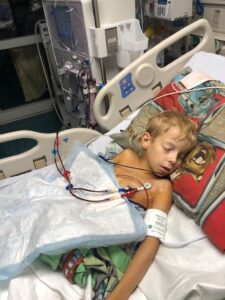At age 11, Aaron Ritz woke up with side pain. His pediatrician sent him to the hospital where he was found to be in complete renal failure. He started dialysis the next day.
 “Aaron was diagnosed with polycystic kidney disease, which he likely had from birth, but aside from being small for his age, we had no signs that anything was wrong,” said Aaron’s mother Brandy Ritz. “In less than 24 hours, our world was turned completely upside down.”
“Aaron was diagnosed with polycystic kidney disease, which he likely had from birth, but aside from being small for his age, we had no signs that anything was wrong,” said Aaron’s mother Brandy Ritz. “In less than 24 hours, our world was turned completely upside down.”There are two forms of polycystic kidney disease (PKD). The autosomal dominant form affects approximately 1/1000 individuals. It typically presents in adulthood and is most often caused by a single genetic mutation in one of two genes, PKD1 or PKD2. The autosomal recessive form of PKD is less common (1/20,000) and presents prenatally or in early childhood with two mutations within the same gene.
Aaron’s nephrologist suggested genetic testing due to the unusual nature of his clinical presentation, so he was seen at the Greenwood Genetic Center. Testing revealed no mutations in the genes most commonly associated with polycystic kidney disease, but he did have a single variant in a gene called NEK8.
“NEK8 is known to be a rare cause of autosomal recessive PKD when there are two mutations present, and typically there are also other extra-renal manifestations such as liver and pancreatic involvement,” said Rich Steet, PhD, Director of Research at the Greenwood Genetic Center (GGC). “But Aaron, who had no other organ involvement, only had a single genetic change in NEK8 which had never been associated with kidney disease.”
Given the puzzling results, Steet embarked on additional research testing to try and clarify this unexpected finding. By reaching out to other genetic testing laboratories and using GeneMatcher, an online tool that connects clinicians and researchers who have an interest in the same gene, Aaron’s genetic evaluation grew into a major international collaboration. Steet connected with geneticists in the US, the Netherlands, the United Kingdom, Canada, Belgium, Denmark, the Czech Republic, and Romania, and ultimately identified 21 individuals within 12 families who had both polycystic kidney disease and a single variant in NEK8. All of these patients also had a second normal copy of the NEK8 gene.
Numerous additional experiments were conducted by the collaborative group to confirm that these single variants were causative for PKD and to better understand how they cause kidney disease.
“Our experiments suggest that the genetic variants identified alter the NEK8 protein function in a very specific way,” said Steet. “It appears that the abnormal protein produced by the NEK8 variant in these families prevents certain other proteins from moving to cilia, structures in kidneys that help them function normally. When these proteins fail to localize to the cilia, severe cystic kidney disease develops.”
 After a rough disease course which included severe hypertension, a stroke, and the removal of both diseased kidneys, Aaron had a complicated, but ultimately successful kidney transplant at age 12 and now, at 16, is thriving.
After a rough disease course which included severe hypertension, a stroke, and the removal of both diseased kidneys, Aaron had a complicated, but ultimately successful kidney transplant at age 12 and now, at 16, is thriving.
“Aaron has a regimen of medications that he will have to take for the rest of his life, but he’s doing great – working a part-time job and playing golf for his high school team,” said Brandy. “It all happened so fast, we didn’t really have time to process what was going on at the time, but now, to have the worst behind us and to have a clear diagnosis means everything!”
Steet noted that this is important work that expands our understanding of both the NEK8 gene and polycystic kidney disease. “In the future, clinicians should pay attention to single NEK8 variants in patients with PKD, include this gene in genetic testing panels, and consider the possibility of a single NEK8 variant as disease-causing,” added Steet.
The collaborators published these new findings in Kidney International, a journal of the International Society of Nephrology, in August.
